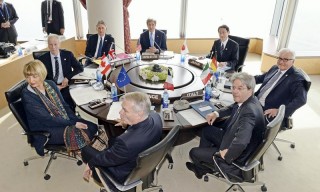Loading
Search
▼ G-7 Ministers Pledge Antiterrorism Plan
- Category:Other
By Atsuko Matsumoto / Japan News Staff Writer
HIROSHIMA — Foreign ministers of the Group of Seven major countries pledged to work in unity on an action plan to combat terrorism, aiming to adopt joint concrete measures at next month’s Ise-Shima summit meeting.
The two-day meeting wrapped up Monday with the issuance of four joint documents.
Pledging to confront the shared threat of terrorism, the leaders severely condemned the terrorist attacks in Europe and the Middle East by the Islamic State of Iraq and the Levant (ISIL) militant group in a joint communique saying that in response to the current threat level, they are working on a G-7 action plan on countering terrorism that will include concrete measures to enhance G-7 and international counterterrorism efforts, to be adopted at the Ise-Shima summit.
“As chair of the G-7 meeting, I’m proud that we sent a strong message to the international community, and I’m determined to relay this success to the Ise-Shima summit,” Foreign Minister Fumio Kishida said at a press conference after the meeting Monday.
In addition to the threat of terrorism, the leaders candidly exchanged views on North Korea’s continued provocations and China’s growing maritime advancement in the East China and South China seas.
The G-7 leaders issued the Foreign Ministers’ Statement on Maritime Security, in which they shared concern over the situation in the East China and South China seas. The statement said they “express our strong opposition to any intimidating, coercive or provocative unilateral actions that could alter the status quo,” urging all states to refrain from “such actions as land reclamations.”
The statement calls for “the peaceful management and settlement of maritime disputes,” and also stresses the importance of international law and the use of such measures as arbitration and internationally recognized mechanisms for settling legal disputes.
This was the second statement issued by the G-7 foreign ministers on the subject after last year’s meeting in Lubeck, Germany. It again avoided making specific references to China by name.
Kishida said, “We thoroughly discussed issues related to the Asian region, especially maritime security,” adding that the Hiroshima meeting was the first such occasion held in Asia in eight years. “Maritime security is now an interest to the international community, not only limited to the Asian region,” he said.
The G-7 leaders also encouraged efforts to enhance greater transparency of nuclear arsenals and called on world leaders and young people to visit Hiroshima and Nagasaki, the two Japanese cities hit by atomic bombings, in the Hiroshima Declaration adopted Monday.
“Both nuclear and nonnuclear states are members of the Group of Seven.
In promoting nonproliferation efforts, it was meaningful that we, as the G-7 framework, discussed the matter and reached a consensus to issue this declaration,” Kishida said.
In the declaration, the leaders reaffirmed their “commitment to seeking a safer world for all and to creating the conditions for a world without nuclear weapons in a way that promotes international stability.”
On North Korea’s provocative nuclear test in January and ballistic missile launches in February and March, the leaders were united in denouncing the outrageous acts as a common threat to the international community.
The Hiroshima meeting was the first ministerial meeting among those scheduled to be held in Japan before and after the G-7 Ise-Shima summit.
In addition to Japan, the G-7 comprises Britain, Canada, France, Germany, Italy and the United States.
Major points of agreement
■ The ministers agree on the importance of maintaining a maritime order based on international law amid shared concern over China’s actions, without calling its name, that could alter the status quo in the East and South China seas.
■ The ministers have no tolerance of North Korea’s nuclear and missile development, which undermines stability and peace in the international community.
■ The ministers affirm their commitment to taking the lead in strengthening international counterterrorism coordination and creating a society that does not foment violent extremism and radicalization.
- April 14, 2016
- Comment (0)
- Trackback(0)


